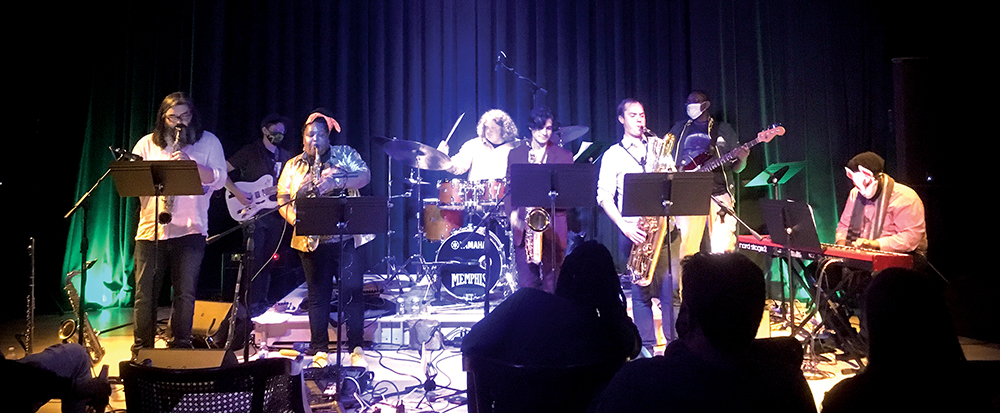August 17, 2018, was a historic night in the Bluff City. A new space in the newly renovated Crosstown Concourse, The Green Room, was about to enjoy its inaugural concert — the culmination of years of planning. A sizable audience had gathered to hear the music of celebrated avant-garde pioneer John Cage, and a hush fell over the room as the lights dimmed. Then Jenny Davis, a flutist in the genre-defying Blueshift Ensemble, stepped up and began to play … a cactus.
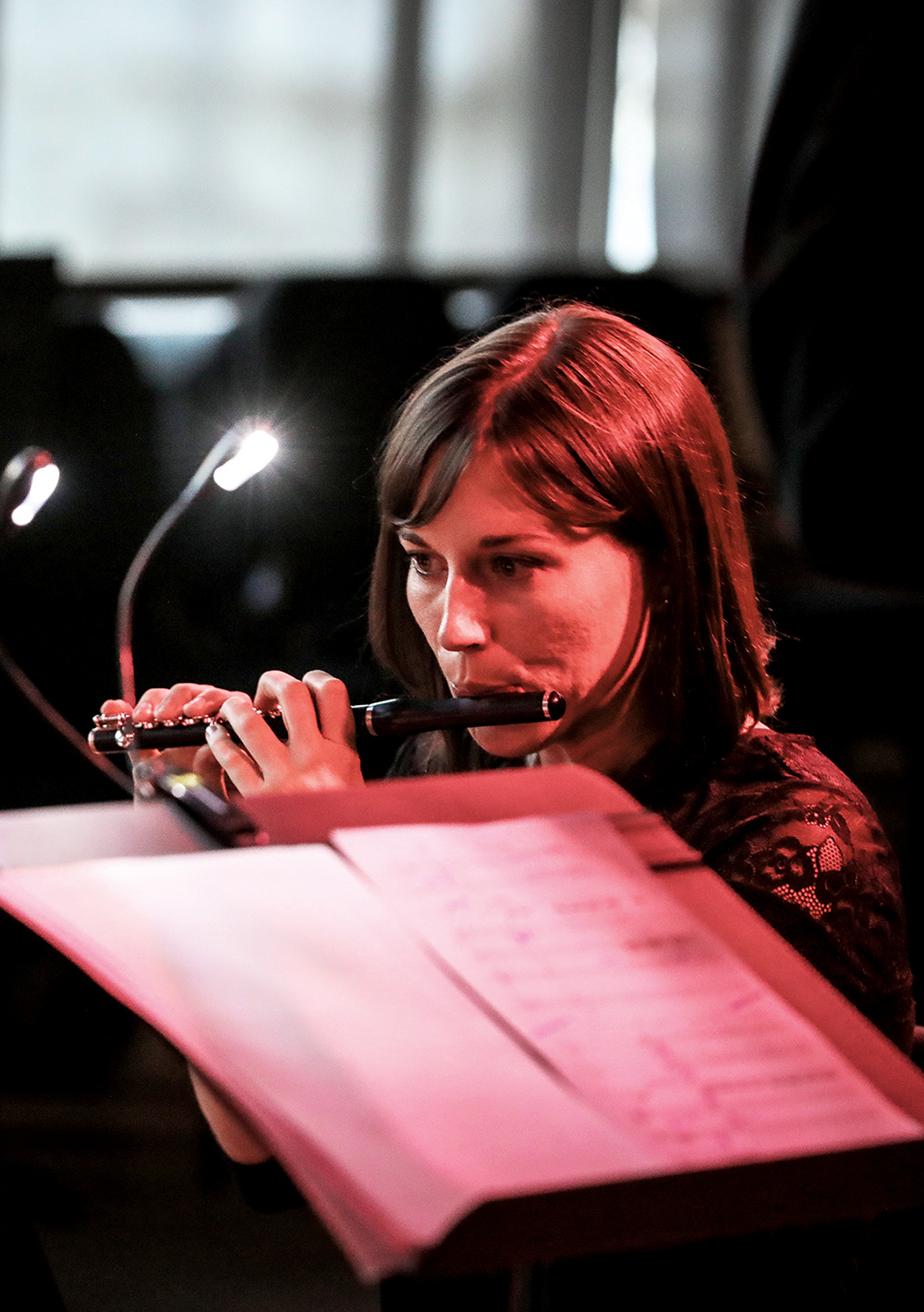
Around her was a scene from a gardening shop. Cacti of different sizes were arrayed on a table, and Davis was systematically plucking the thorns of each plant as if it were a drum. Each movement resonated over the sound system; the cacti were outfitted with microphone pickups. It was as if we’d all shrunk to the size of geckos, immersed in a world of desert greenery, every brush of the needles an arpeggio.
For lovers of unusual sounds and textures, Davis’ performance was captivating. But it also marked the beginning of an avant-garde renaissance that is putting Memphis on the map of all that is strange and fascinating in 21st century music. It was only fitting that Davis was making the sounds, as that night foreshadowed the extent to which she, as programmer of Crosstown Arts’ musical performances, would be making waves. As it turns out, she’s only one of a host of players and presenters who are introducing Memphis audiences to sounds well off the beaten path. Beyond that, she sees no need to define what the music is. It’s here to stay, whatever you call it. “The avant-garde realm is hard to describe,” Davis says. “It becomes kind of tricky. Maybe it’s not even necessary to always describe something as being in one genre or another.”
The Cactus in the Room: A State of Mind
As Davis notes, playing Cage’s “Child of Tree” that night was a prescient grand opening. “That was the first concert we ever did in The Green Room,” she notes, “which I love. We christened the room with some John Cage!” In keeping with that, the space has become a key venue for musicians who want nothing more than to be listened to, and it’s likely rooted in the context of that first show. As part of the 2018 Continuum Festival, also organized by Davis, attendees could learn of the different states of mind that most avant-garde music demands, with talks on “Suggestions on How to Listen to Contemporary Classical Music” or a “Mindful Listening Workshop” based on composer Pauline Oliveros’ sound and meditation activities.
The seriousness suggested by such presentations is often belied by the sheer playfulness of the music. Beyond cacti, for example, the John Cage tribute also included his “Imaginary Landscape No. 4,” in which players adjusted the frequencies and volumes of 12 transistor radios. Whether whimsical or disturbing, the one thing that most avant-garde, experimental, or “out” music has in common is the need for deep listening. While B-Side Memphis or the Lamplighter Lounge have also cultivated scenes for strange music, The Green Room and its big sibling, Crosstown Theater, have set the standard of spaces that encourage silence.
Art Edmaiston, a veteran saxophonist of more conventional R&B, soul, and rock ensembles, has played enough noisy bars in his storied career to really appreciate silence. “You know, people wander into bars just to have a drink, and then they’ll say, ‘What is this? Why is a guy dragging a music stand across the floor? What’s going on with the flame thrower?’” he says with a chuckle. Such a crowd may not be tuned in to the subtleties of experimental music, and that can impact the playing itself. “The other thing is how quiet some of the music can be,” he notes. “We’re all listening. If you’re not in a listening environment, which means the crowd has to be quiet, then it’s hard for us to communicate, almost telepathically, and everybody’s going to miss what’s going on.”
What’s Going On
Edmaiston is a key figure in the local music landscape, and his involvement in the free improvisational group SpiralPhonics is indicative of just how much is happening on the cutting edge here. As he describes it, just having a venue for avant-garde music has made all the difference. “It’s hard for our little group to find places,” he says. “Revenue and venue, it’s all kinda in there together. You’ve got to find people. Listeners needed!” That has usually required staying on the more accessible side of the street. “Playing commercial music, you have a structure and vocabulary applicable to that situation. If you come in playing like Albert Ayler on [a track like] ‘Take Me to the River,’ you’re not going to be called back. So throughout most of my career, I was trying to assimilate, trying to be a studio musician. I’ve had a life of doing that, but never lost my desire to be on the more artistic side of things.”
When drummer Terence Clark proposed collaborating in a more improvisational context, and they joined forces with guitarist Logan Hanna to form SpiralPhonics, the mere existence of a venue helped them to manifest their vision. “We only played sporadically,” he recalls. “So we booked The Green Room in order to make us get our stuff together.” Ultimately, the gig not only brought their group into focus; it led to their debut album. “The Green Room being a listening room, that’s the spot to do it,” says Edmaiston. “That’s where we recorded our Argot Session. It was a live performance that we recorded there, and we couldn’t have done it anywhere else. It would take a lot more tries to get good takes and a quiet environment somewhere else. Your head space has to be right.”
Others note the resurgence of “out” music as well. Chad Fowler, a saxophonist, woodwind player, composer, and producer from Arkansas, studied at the University of Memphis in the 1990s, and the experimental music scene here at that time had a profound impact on him. Having then left town, he was surprised upon his return over a decade later. “I felt, when I first moved back to Memphis six or seven years ago, like there was a real dearth of creative music happening. It was kind of disappointing. I felt it had been stronger in the ’90s. However, since then it feels like it’s changed. A lot of it is due to Jenny Davis and Blueshift. Crosstown and B-Side have made a huge difference.”
The scene’s personal impact on Fowler is in turn reflecting back on the local environment. Having ultimately settled back in Arkansas, he’s nevertheless a regular in the avant-garde music world of Memphis, even as he also increases his profile in the New York experimental scene. His Mahakala Music label, focused on experimental jazz, has built on associations he forged in the ’90s Memphis scene, with players like Marc Franklin, Chris Parker, and Kelley Hurt, and Anders Griffen often appearing on Mahakala releases today. But he’s also used his and others’ connections to New York, Chicago, and New Orleans to create ensembles of world-class players from elsewhere, often bringing them to Memphis.
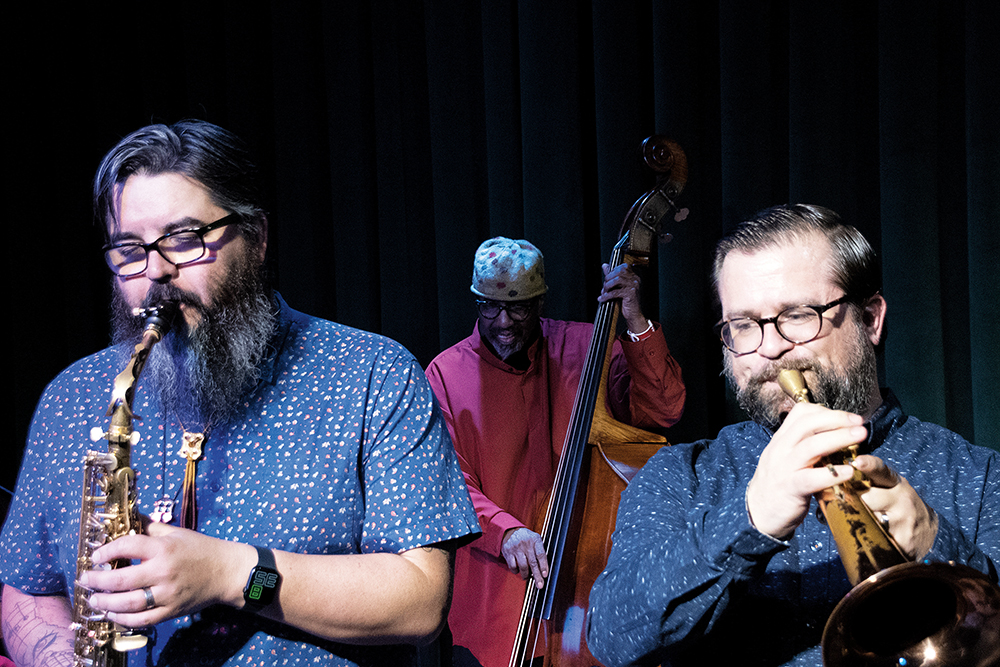
As Fowler notes, “It’s kind of weird because the same people might be on, like, a New York Times best of jazz year-end list but then also playing in a room the size of a closet for a tiny crowd in Brooklyn. We might get better audiences in Memphis for the same music.” He points to a gig by one of Mahakala’s “all-star” groups, Dopolarians. “With the Dopolarians show, I think William Parker was blown away by how great the energy was when we were there in The Green Room — by how many people came out, how engaged the audience was. It was a good experience.”
Collaborating with William Parker, a highly respected free jazz bassist and co-organizer of the Vision Festival, “New York City’s premier live free jazz event,” according to The New York Times, has been a boon to Fowler and Mahakala, arising quite organically from Fowler’s earliest free jazz experiences. Parker played on the debut album of Memphian Frank Lowe in 1973, as Lowe’s star was rising. Ultimately, Lowe would join Alice Coltrane’s band and enjoy a solo career of some renown, yet would still return to Memphis and jam with the likes of Fowler, Franklin, Chris Parker, and other University of Memphis students. Now, Fowler carries that inspiration back to New York on a regular basis, often playing with William Parker in various ensembles and recording projects. Mahakala’s star is now rising as well. “The first record we put out was on Rolling Stone’s end-of-year jazz roundup list,” says Fowler, “and since then, pretty frequently, we’ve been mentioned in Jazziz, JazzTimes, DownBeat, and all the go-to jazz publications. It seems the label is becoming one of the most respected of the genre, even though it’s very new.”
Lately, the links between Memphis and leaders of free jazz from the Northeast have only strengthened, as when drummer Ra Kalam, aka Bob Moses, who’s been on the cutting edge of the free improvisation world since the ’60s, relocated to Memphis permanently. Edmaiston recently played with the drummer on a New Year’s Eve show and was surprised at his embrace of more traditional R&B. Edmaiston recalls, “Ra Kalam told us, ‘Hey man, that was ‘Cleo’s Back!’ I recorded that in 1967 with Larry Coryell and Jim Pepper. We used to play it all the time!’ So that was kind of wild. He can play inside, but he’s developed into something else. When he plays himself, he says, it’s like he’s got to be in Europe to be expressive. Over here, less people want to hear that. Over there, he’s celebrated for it.” Yet now, with improvisational music on the rise here, that’s changing. On January 18th, Ra Kalam will be holding a master class and concert at Nelson Drum Shop in Nashville.
New Music, from Punks to P-basses to Piccolos
If there’s an uptick in free jazz and improvisational groups like SpiralPhonics and Fowler’s various projects, that’s just the tip of the iceberg. Indeed, since Jenny Davis and Jonathan Kirkscey founded Blueshift Ensemble, a loose collection of Memphis Symphony Orchestra players with a penchant for experimental music, an Iceberg has orbited them — for that’s the name of a composers’ collective that collaborates with Blueshift every August to bring their works to life. “I like to have some new stuff along with some more familiar sounds, and that’s a nice way to introduce new things to audiences,” says Davis. “Blueshift’s work with Iceberg New Music, the composer collective out of New York, encapsulates that idea, too, because it’s a group of 10 composers, some of them more on the experimental, avant-garde side of things and some whose works are more lyrical and tonal, so you have the whole spectrum of what’s going on in new classical music today.”
Other avenues have long been available for the edgier side of the classical world, though they tend to be tucked into programs that showcase more traditional works. Conrad Tao’s “Spoonful,” commissioned in 2020 by the Iris Orchestra in honor of Memphis’ bicentennial, was a New Music tour de force, pivoting from cacophony to explosions of orchestral texture to delicate piano lines in a heartbeat and even a sample of Charley Patton’s “A Spoonful Blues.” It lost none of its power by being sandwiched between works by Haydn and Brahms. And many such experimental works continue to percolate out of the classical world.
A more hybrid approach was concocted by David Collins’ Frog Squad, when they premiered his arrangements of the music of Erik Satie at The Green Room in 2021. Turning the composer’s original sparse arrangements into showcases for a more jazz-oriented octet represented a perfect balance between accessibility and “out” music, as the players took solos with the abandon of a free jazz group, even as they remained grounded in the composer’s classic works. This year, they’re set to release a similar treatment of Horace Silver’s music and an album of all originals.
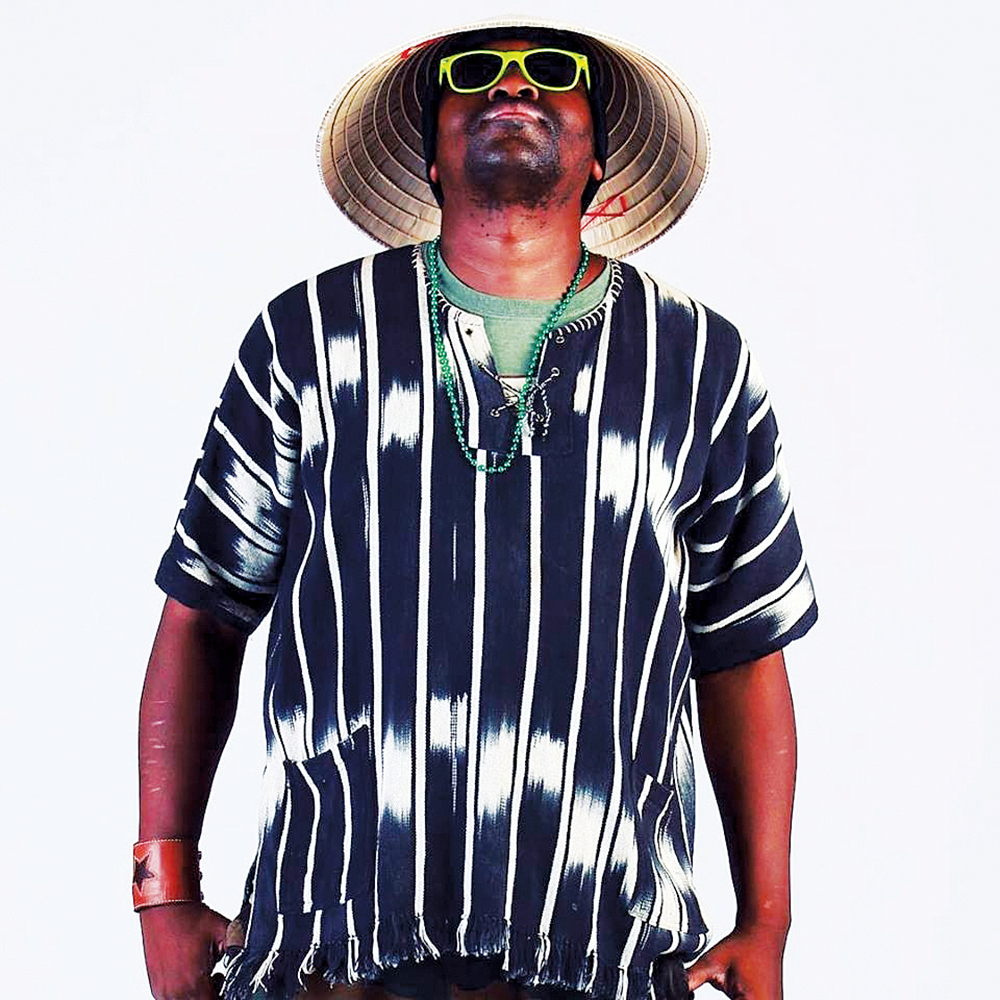
Frog Squad’s bassist, Khari Wynn, is a virtuoso in his own right. While best known as one of Public Enemy’s go-to guitarists, his real passion is a kind of Afrofuturism first pioneered by his hero, Sun Ra, yet channeled through a thousand other influences he’s absorbed over the years as he plays under the name Misterioso Africano, or a few years back, The Energy Disciples.
But there’s plenty of experimentation coming from less-schooled musicians as well. Goner Records has long waxed enthusiastic for musical risk-takers, and in recent years they’ve brought many edge-walking groups to the city, from the surrealist big band sounds of Fred Lane to the free improvisational textures of Wrest to Tatsuya Nakatani’s Gong Orchestra. The latter wowed music fans gathered at Off the Walls Arts last year, part of that gallery space’s increased staging of “out” musical events under its roof.
The label has also played host to some of the city’s more rock-adjacent groups who test the boundaries of conventional musical ideas through combinations of electronic music and guitar noise, from Aquarian Blood to Nots to Optic Sink, who all offer servings of noise and synth madness to variations on the big beat of rock. Yet other, less-punk groups are dipping their toes into strange waters at the same time. Salo Pallini’s new independently released album advises it be filed under “Progressive Latin Space Country,” and while that obscures the heavy dollop of rock in their sound, it does capture their everything-but-the-kitchen-sink approach. They’ll be playing a record release show on January 20th at — you guessed it — The Green Room.
Some of these artists are also featured in the annual Memphis Concrète festival of electronic and experimental music, also centered in and around Crosstown, set to resume this June after some Covid-related setbacks.
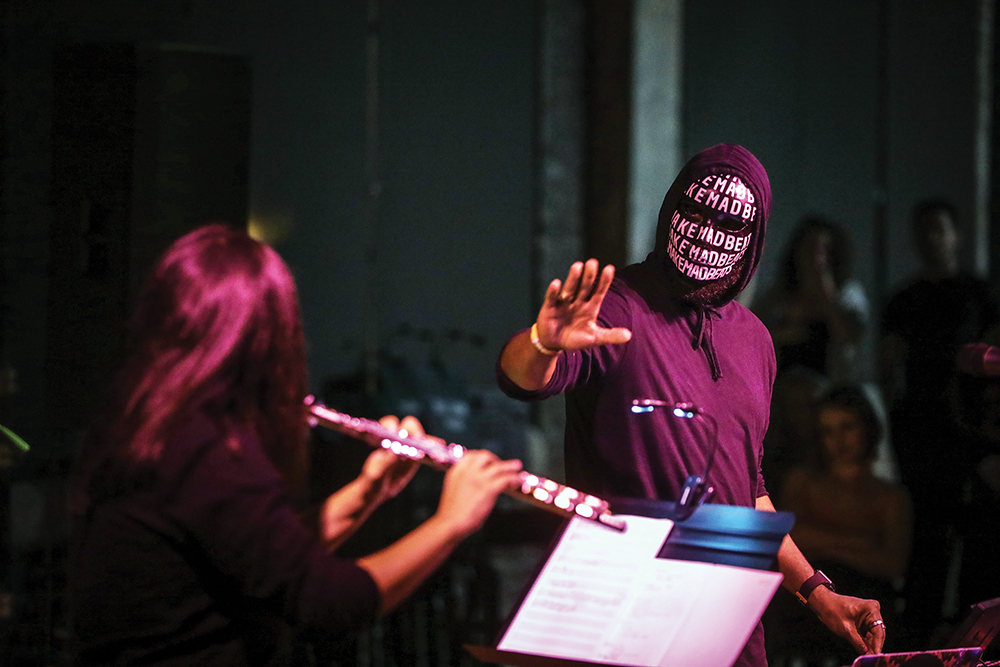
Meanwhile, more hip-hop-adjacent sounds are percolating through the city. Unapologetic, who have long celebrated strangeness and vulnerability in their edgy hip-hop productions, now have a dedicated studio space, and producer IMAKEMADBEATS is enthused about the possibilities for combining traditional beat production with live players free to create new textures in a more spacious setting. “We’re all electronic/hip-hop-based producers who play instruments,” says IMAKEMADBEATS. “Finally having the kind of space that allows us to easily incorporate live instrumentation into our music is a game changer here. Because our minds are decades-trained to think of warping sounds in ways never done traditionally, but now we can combine that with traditional instruments in a space sonically set up to present it in an amazing way. Our producer engineers aren’t just band recording people or rap recording people. They are that and everything in between. We just needed space. Now it’s time to take off.”
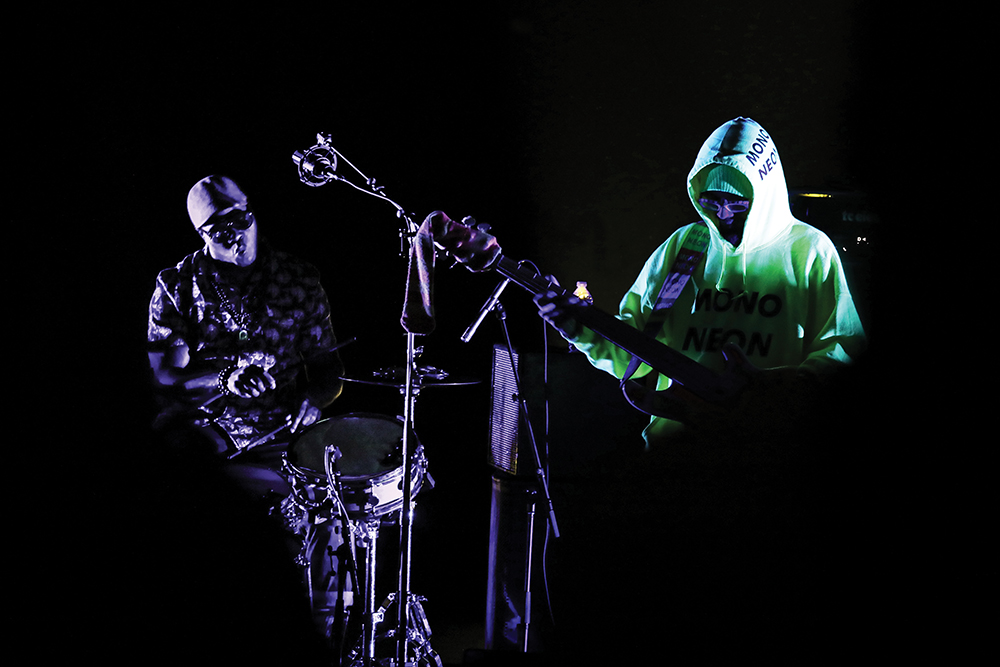
Of course, the kitchen-sink approach has also been perfected by MonoNeon, whose transpositions of Cardi B tirades into carefully pitched bass solos and whose jams in his YouTube offerings may be the most experimental music of all. While he often records at home, he’s also branched out with other producers, including his work with Unapologetic. Like most of these artists, he’s appeared at The Green Room and/or Crosstown Theater multiple times. So it is that we must give credit where credit is due, as Crosstown Arts sits squarely at the center of the avant-garde revival. As Amy Schaftlein, co-host of the Sonosphere podcast and radio show, notes, “Jenny Davis has been doing such an amazing job of getting great artists to come to Crosstown Theater and The Green Room. She’s continued in that vein of ‘Let’s try to get folks to Memphis who may not hit us on their tour.’” Often recruiting acts on their way to or from Knoxville’s Big Ears Festival, Davis has brought a steady stream of experimental and jazz artists to town, the likes of which have not been seen in decades. This March and April alone, Crosstown will feature Deepstaria Enigmatica, Makaya McCraven, SpiralPhonics, The Bad Plus + Marc Ribot and the Jazz-Bins, Tarta Relena, Ami Dang, and Xiu Xiu.
All of which is making the city a richer, more connected community. As Davis says, “I like the challenge of hearing something new. And [it] can be jarring at first. But then if you go back a second time, you start to see the patterns and it’s like learning a new language. I think that keeps things interesting.”
